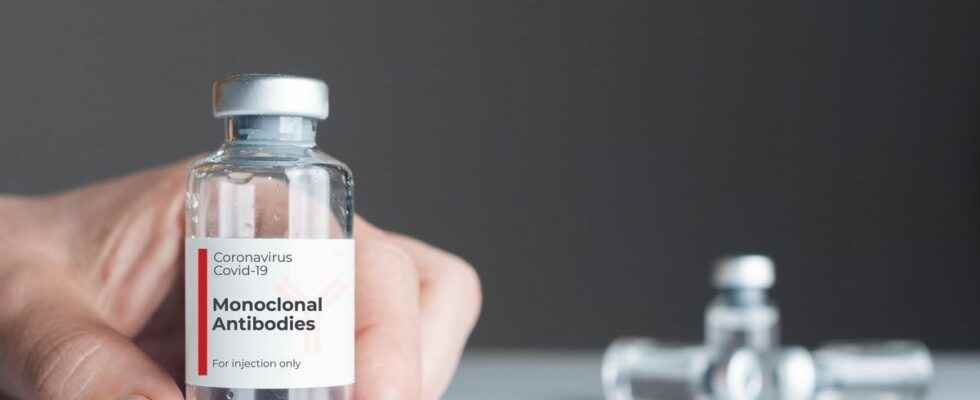Published on
Updated
Reading 3 mins.
Researchers from the University of Alabama at Birmingham in the United States have developed a therapy against the Covid-19 virus but also all its variants as well as the SARS, MERS viruses and several other coronaviruses. It is a monoclonal antibody, which can be injected nasally and has a long duration of action.
American researchers have just developed a neutralizing monoclonal antibody, to treat SARS-CoV-2 and all its variants (Beta, Gamma, Delta, Epsilon and Omicron), but also against the previous deadly SARS-CoV coronaviruses, the syndrome acute respiratory syndrome appeared in China in 2002, and MERS-CoV, the Middle East respiratory syndrome appeared in Saudi Arabia in 2012. It even shows activity against other coronaviruses, such as those of winter colds. Their results are published in the scientific journal Plos PathogensJuly 21, 2022.
find another way
The researchers’ overall goal is to find antibodies that do not allow immune evasion by mutated variants of SARS-CoV-2, the virus that causes COVID-19. This includes Omicron and all its future variants, and even other related viruses. It could also guide the development of new vaccines with broader efficacy and less susceptible to mutations.
Indeed, research so far has focused on developing antibodies that primarily target the receptor binding domain, or RBD, located at the end of the Spike (S) protein of SARS-CoV-2. . Although it is an effective part of the virus to elicit an immune response, it is subject to many mutations that decrease antibody binding.
An antibody that targets the protein S stem
To achieve these results, the scientists targeted their efforts on another part of the S protein, the S2 domain, which has the advantage of being less prone to mutations and similar between different strains of coronavirus.
The second advantage of targeting this protein is the fact that it is essential for the virus to penetrate cells, to infect them. It is this penetration that then allows the virus to proliferate within host cells and then release virions, capable of infecting other cells in turn.
Collection of blood samples
To work on obtaining antibodies, blood samples were taken from hospitalized patients at the University of Alabama Hospital in Birmingham. The scientists then looked at the memory B cells present in the blood of these patients.
They were linked to personalized “baits”, to mimic the natural state of the S2 domain of the S protein. Objective: to create a panel of unique cells capable of producing human monoclonal antibodies, or hmAbs, targeting this S2 domain which could neutralize viruses, ie block their entry into our cells.
First mouse tests
A total of seventeen human monoclonal antibodies showed binding to protein S2. Only four of them were able to neutralize a SARS-CoV-2 pseudovirus and a live SARS-CoV-2, including Beta and Omicron variants. Tested in mice, the most effective antibody has neutralizing activity on strains of Sars-Cov-2 (initial and variants) but also against the SARS and MERS viruses, as well as other coronaviruses causing seasonal colds.
Towards a universal vaccine?
“Many SARS-CoV-2 RBD-specific hmAbs have been approved for clinical use. Unfortunately, several have become useless due to their inability to neutralize variants of concern, including the newer Omicron, highlighting the perilous future of RBD-only mAb therapies against coronaviruses“says Professor James J. Kobie, one of the main authors of this work.
For him, these results could help in the development of a universal vaccine against the coronavirus. Remember that the Covid-19 pandemic, which has been raging for almost 3 years now, has killed 6.3 million people around the world.
Consult a GP online
“Encouraging results but let’s remain cautious”
Asked about this study, Dr Ivan Pourmir, oncologist at the George-Pompidou European Hospital and immunology researcher, welcomes the results of this work.
“These antibodies targeting the S2 domain of protein S have been isolated from people recovering from natural SARS-CoV-2 infection and appear to have been elicited by a specific part (epitope) of this domain. This is also an encouraging result since it suggests that after a natural infection one can produce neutralizing antibodies of many different variants. On the other hand, it remains to determine which epitope it is in order to try to elicit the same type of antibody by vaccination.“.
But he also relativizes the scope of these conclusions: “It is also necessary to be careful with antibodies because some are neutralizing when there are enough of them, but when their concentration drops, at a distance from the injection of antibodies or vaccination, it could become a facilitator of the infection of certain cells. by forming a bridge with the viruses they cling to. Indeed the antibody studied in this publication clings both to the virus but also to cells having an antibody receptor (Fc-receptor)” concludes the specialist.
